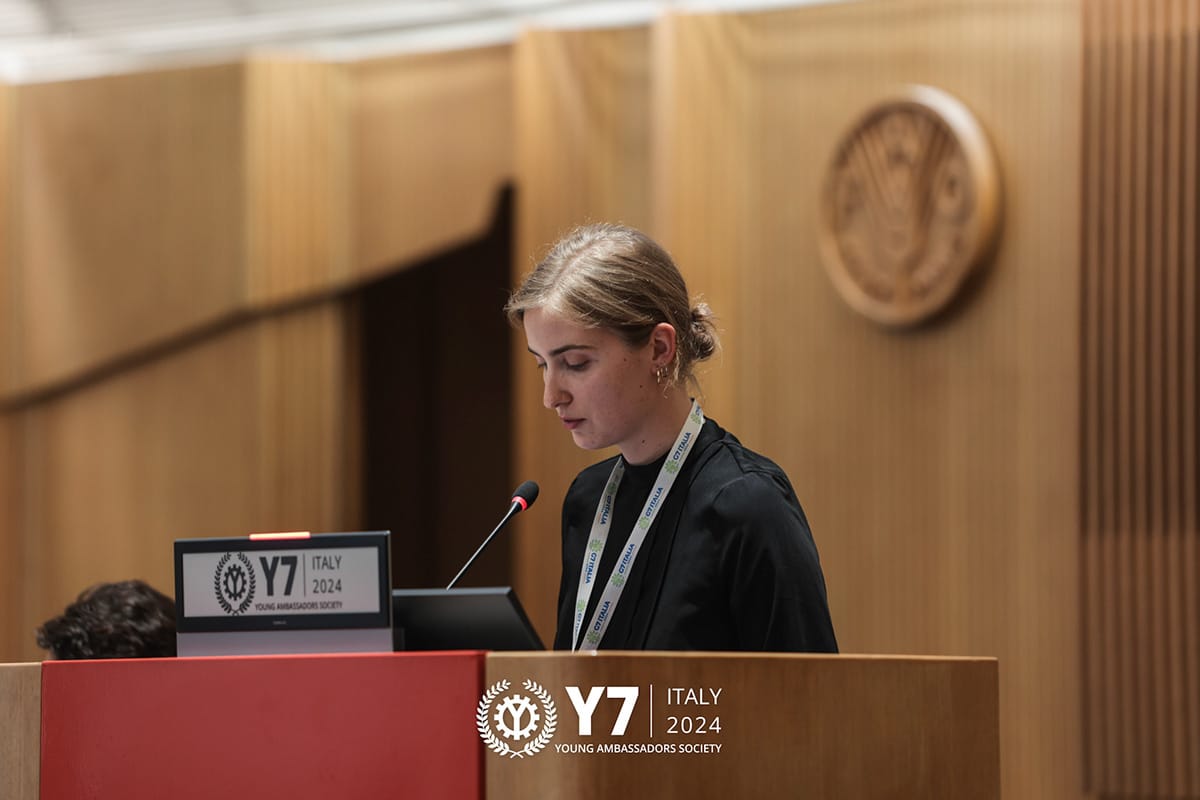Karolina Hajkova, a Czech national, is the EU Youth Delegate for Environmental Sustainability and Climate Change for Italy’s G7 presidency in 2024. She holds a BA from Sciences Po Paris, complemented by an exchange at Bocconi University, and will pursue a Master’s in Economics and Public Policy starting in September. Her professional experience spans various sectors, including climate finance at the Czech Ministry of Finance and innovation and AI at the Silicon Valley-based venture building firm U+. Having lived and studied across three EU countries, Karolina offers a distinctive perspective that connects Western, Central, and Eastern Europe, enabling her to drive innovative and effective solutions in policy.
What do you think most prepared you to be a delegate before you were appointed to represent the EU at the Youth 7 Summit?
Before being selected as the EU delegate to the Youth 7 Summit, several experiences prepared me for the role. First, studying at international campuses taught me how to effectively communicate and advocate my views across different cultures and languages. Furthermore, my time at the Ministry of Finance prepared me through hands-on experience. I worked on integrating EU climate finance mechanisms into the Czech fiscal and budgeting landscape and engaged with various stakeholders, both public and private, to understand their views on the EU climate finance framework. This role involved drafting policy briefs and preparing content for the minister, which enhanced my ability to summarize complex information and present it effectively to various audiences.
I also gained an understanding of how national and EU policies interact, especially in areas like energy, where different countries have unique needs and starting points. This experience taught me that a one-size-fits-all solution often doesn’t work due to these differences. At the Youth 7 Summit, this insight was vital for representing the diverse interests of 27 countries. A key part of my role as a representative of the EU was crafting solutions that are both flexible and effective while balancing various national contexts.
What can you tell us about your experience at the summit? Were the negotiations what you expected them to be?
As I prepared for the summit, I anticipated challenges arising from the diverse climate landscapes and energy resources of the G7 countries. Despite these regional differences, I expected that the youth delegates would share a unified vision for advancing climate policies and achieving a better future. The prior preparation was key to a smooth negotiation process. Having engaged in several online negotiations before the summit, we entered the in-person meetings in Rome with a solid foundation. This previous work allowed us to focus on the finer details more effectively.
For me, one of the summit’s standout moments was the interaction with external observers. Their insights proved invaluable, offering constructive feedback and suggesting additional climate policy areas we might have overlooked. This external perspective helped us refine our proposals, ensuring they were both practical and impactful. Another aspect of the summit was navigating the dynamics of EU representation. Alongside the EU delegation, individual EU countries like Germany, Italy, and France had their own delegates. Balancing their specific interests with the broader perspective of representing all 27 EU member states added complexity, but it was a dynamic we managed to navigate effectively.
Overall, the summit was characterized by respectful and collaborative negotiations. Delegates put aside personal agendas to work towards our shared goals. I was pleased with the final outcome, because despite the broad scope of climate policies, we successfully streamlined our focus and delivered a cohesive and impactful final document.
What was some of the work that you pushed the hardest to highlight in your track and why do you think that what you advocated for was important?
I was particularly passionate about three key issues: expanding the EU Sustainable Finance Framework to encompass all G7 countries, tackling various forms of pollution, and promoting biodiversity. The G7 nations hold a significant share of the world’s financial power and by aligning their investment practices with sustainable standards we can initiate substantial progress in green finance and technology on a global scale. Additionally, I focused on the urgent need to address all forms of pollution (including air, water, soil, and plastics) since they have a profound impact on public health and ecosystems. For example, air pollution alone is responsible for around 7 million premature deaths each year (World Health Organization). Biodiversity was another critical issue I advocated for. Healthy ecosystems are invaluable as they provide services worth roughly $125 trillion each year and play a key role in maintaining ecological balance (World Economic Forum). With nearly a million species facing extinction, we are in need of robust policies to safeguard these ecosystems and further global conservation goals. In addition to my primary focuses, I actively supported several important proposals from other EU and G7 delegations that I believe would benefit the entire bloc, and ultimately, the entire world.
What was your greatest hope going into the negotiations this year and how do you feel about the end product in your track?
My greatest hope going into the negotiations was to foster a truly collaborative environment where we could create actionable recommendations that address the critical issues of climate change and environmental sustainability. And so reflecting on the final communiqué, I am particularly proud of several key measures we included in the communique to the G7 leaders.
One significant recommendation was to legislate fossil fuel industries to stop all additional investments in oil and gas assets and redirect them to low-carbon energy capacity by 2030. We also made substantial progress in pollution control by recommending the elimination of toxic chemicals like some PFAS, implementing the 2021 WHO air quality guidelines, and creating harmonized targets for soil and water pollution. Another important recommendation was to unify biodiversity conservation, restoration, and adaptation standards by 2026. We also proposed binding targets for responsible forest management and wildlife corridors, which are vital for maintaining ecosystem stability and protecting species at risk of extinction. Finally, we also addressed the need for sustainable value chains by proposing a Global Circular Economy Agreement to expand corporate environmental reporting and introduce financial incentives.
Overall, I am satisfied with the outcome as it includes a comprehensive range of innovative and effective strategies that align well with my initial hopes and represent significant advancements in our collective efforts to tackle environmental challenges.
You have already engaged in a bit of dissemination as part of your time as a Y7 Delegate, having met with the VP of the Spanish Senate and the Head of the EU Delegation in Rome. What other work do you plan to do during the remainder of your term as a Y7 delegate in 2024 to advocate for the work that you achieved in the communique?
Along with my fellow EU delegates, we plan to discuss the proposed measures with key policymakers and stakeholders. We will start with the newly formed EU Parliament and Commission to ensure our recommendations are considered in future legislative and policy initiatives. Personally, I am specifically targeting those who focus on the climate agenda or have been instrumental in creating the various legislative tools and frameworks in recent years, both on the EU and national levels.
Additionally, I intend to reach out to academic institutions and collaborate closely with student associations to engage the youth in these critical discussions. To extend beyond academia and achieve the broadest reach, I will utilize channels popular with EU youth, such as various social media platforms, to effectively communicate our work and encourage active participation in these initiatives. Hopefully, by combining these strategies, we aim to build strong support for our proposed measures and drive meaningful action across the EU.
Is there anything that you would like to recommend to others out there that are considering applying to be a Y7 or Y20 delegate in 2025?
Yes! Firstly, don’t be afraid to apply, even if you’re not an expert or don’t have extensive professional experience. If you are passionate about one of the summit topics, your enthusiasm and unique perspective can be a valuable contribution to the discussion.
Secondly, the YEL team is there to support you. If you are selected, they will provide assistance before, during, and after the summit, so you can focus on the policy work while they handle the logistics. Additionally, they also provide a helping hand with the content of the proposed policies through various expert meetings and workshops. And once you get into the flow of negotiations, it’s incredibly satisfying to sift through policies and reports, proposing what you believe is in the best interest of the youth and the EU.
Lastly, representing the EU is a unique and invaluable opportunity. The experience of collaborating with youth from G7 countries, negotiating, consulting with experts, and engaging in youth diplomacy will influence your understanding of policies and shape your perspective on global issues in the future.
If you’re passionate and dedicated, the Y7 or Y20 experience will be rewarding and impactful. Don’t hesitate to apply, as it’s a chance to amplify the voice of EU youth and contribute meaningfully to these important discussions.


